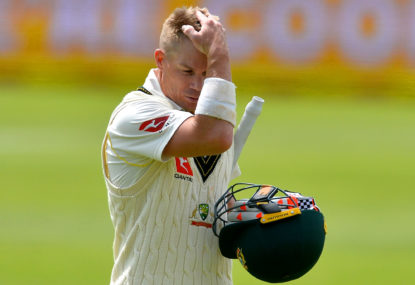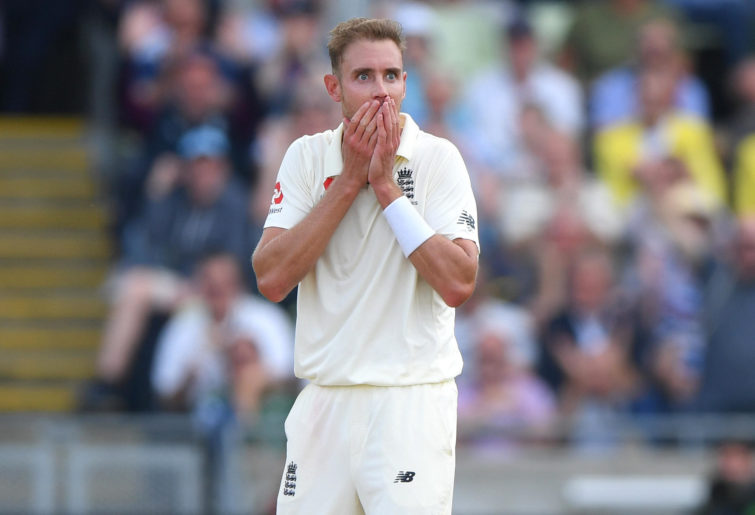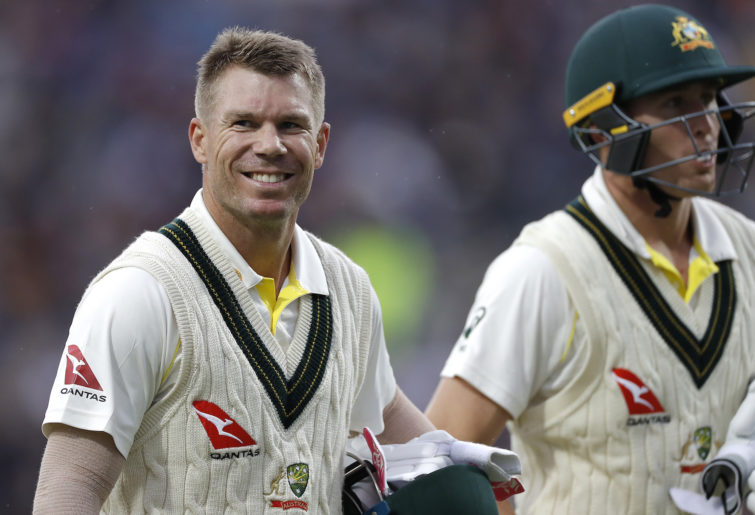Pedro the Maroon
new author
Roar Rookie

Australia has not had an established opening pair since Chris Rogers retired after the 2015 Ashes, which England won 3-2.
Rogers only played 25 matches but he was a beacon of stability considering the 11 combinations Australia has fielded either side of his stint.
The list is long and covers awful tours of England, India, Sri Lanka and South Africa, as well as the nightmarish home series against India and Bangladesh.
1. Joe Burns/David Warner
2. Shaun Marsh/Warner
3. Matt Renshaw/Warner
4. Cameron Bancroft/Warner (both then suspended)
5. Renshaw/Burns
6. Aaron Finch/Usman Khawaja
7. Finch/Marsh (the same match – Khawaja injured)
8. Finch/Marcus Harris
9. Khawaja/Harris
10. Bancroft/Warner (suspension finished)
11. Harris/Warner
Many have been dropped (some were stop-gaps, such as Marsh and Khawaja) but one constant remains – David Warner.
Warner’s record is imposing: 87 Tests, 145 innings, 6442 runs, 21 tons and 30 half centuries, a high score of 253, and an average of 46.01 (which has been as high as 52).
However, his form has completely deserted him in England. His eight innings have yielded a paltry 79 runs (average 9.9) with one scratchy half-century.
He has been Stuart Broad’s bunny and pundits and punters alike are calling for him to be dropped.

Photo by Stu Forster/Getty Images
They point to Warner’s rictus grin after each dismissal for a pair at Old Trafford as proof he’s lost his mojo. The Warner of old would have cursed and scowled, the new Warner doesn’t care.
The 2019 Ashes opening partnerships Warner has shared with Bancroft and Harris read 2, 13, 11, 13, 12, 1 , 1 and 0. Yet somehow we are up 2-1 heading into the fifth test.
Should Warner be dropped? The stats say yes – especially when compared to the numbers put up by those who have been dropped since Rogers’ retirement.
Let’s examine the previous eight innings of those other openers before they were dropped, as well as the incumbent, Harris. Marsh and Kwajaha were fill-ins and are not part of this analysis. Ed Cowan and Phillip Hughes immediately preceded Rogers, so they are included to increase the sample size.
Cowan (32 innings; 1001 runs at 31.28. HS 136): eight innings before being dropped yielded 218 runs at 27.2
Hughes (49 innings; 1535 runs at 32.65; HS 160): 205 at 26.4
Burns (28 innings; 1123 runs at 40.1; HS 180): 295 at 36.9 (includes a 170)
Bancroft (18 innings; 446 runs at 26.23; HS 82*): 209 at 26.5
Renshaw (20 innings; 636 runs at 33.47; HS 184): 98 at 12.2
Finch (10 innings; 278 runs at 27.8; HS 62): 167 at 20.9
Harris (15 innings; 373 runs at 26.64; HS 79): 117 at 16.2
Harris is very lucky to be in the squad and still be playing for Australia. The other thing to note is Bancroft had no right to ever be re-selected, while Renshaw would need to post Haydenesque numbers in the domestic comp to be re-considered.
But we are here to talk about Warner, whose past eight innings have been worse than any of the others. Much worse. So should he be dropped?

Photo by Ryan Pierse/Getty Images
One has to factor in the mindset of selectors and also what weight is given to a batting failure.
In his favour, Warner a mountain of runs, his career average of 46, and the weighting a batting failure is given depending upon whether the Test is won, drawn or lost.
If a failure is any score under 30, in the eight innings we are analysing, we see the following failures:
Warner – seven failures
Cowan – five
Hughes – five
Burns – six
Bancroft – six
Renshaw – seven
Finch – five
Harris – six
The sheer number of failures is horrific reading – most of those scores weren’t even close to the magical 30 cut-off point (only six of the above 47 failures were a score over 20).
By comparison, Rogers retired with just three failures in his previous eight digs (385 runs at 55). All were played in the UK and featured the Nottingham debacle.
But the upshot is that Warner’s failures have come at the least cost to a winning team. Everyone else (Harris and Bancroft excepted) was in a losing side.
Therefore Warner will play at The Oval.
Likewise, Harris’ wretched form will be overlooked because he benefits from being in a team with Steve Smith, Pat Cummins and Josh Hazlewood.
Looking ahead to the summer, if Burns can score some runs at domestic level he must be selected again – if only to form a right-left combination.
He is the standout among those who have partnered Warner. These two have put on a number of century stands.
Yes, Burns has failed more often than not, but when he does score, he scores big. He has four centuries, which is three more than Bancroft, Harris, Head, Labuschagne and Wade combined.
But the case for Joe Burns is another article.